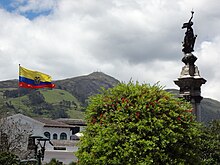Quito Canton
Quito | |
|---|---|
Canton | |
| Metropolitan District of Quito | |
 Location of Pichincha Province in Ecuador. | |
 Quito Canton in Pichincha Province | |
| Country | Ecuador |
| Province | Pichincha |
| Named for | Quitu |
| Seat | Quito |
| Government | |
| • Mayor | Pabel Muñoz |
| Area | |
• Canton | 4,196 km2 (1,620 sq mi) |
| Highest elevation | 4,500 m (14,800 ft) |
| Lowest elevation | 2,400 m (7,900 ft) |
| Population (2022 census)[1] | |
• Canton | 2,679,722 |
| • Density | 640/km2 (1,700/sq mi) |
| • Urban | 1,763,275 |
| Time zone | UTC-5 (ECT) |
| Website | https://www.quito.gob.ec/ |
Quito, officially the Metropolitan District of Quito (Spanish: Distrito Metropolitano de Quito), is a canton in the province of Pichincha, Ecuador.
Governance

The Municipality of Quito (officially the Municipality of the Metropolitan District of Quito) is the governing body of the city of Quito and the Metropolitan District. Its headquarters are at the Municipal Palace, located on the east side of the Plaza de La Independencia. The municipality is made of two principal organs: the mayor's office and a fifteen-member city council.
Administrative zones
The city and canton is administered through eleven Administrative Municipal Zones. Each zone, classified as either urban or suburban, has their own administrator and contain can both urban and rural parishes. They are (parishes covered in parentheses):
|
Urban
|
Suburban
|
Population figures
According to the 2001 census, the total population of Quito (not the city itself) is 1,839,853, with 892,570 men and 947,283 women. According to the 2007 estimates, it is 1,840,000. Of this, the population of the urban parishes (the city of Quito itself) was 1,399,378, and the population of the rural parishes (outside of the city of Quito but still within the canton) was 440,475.[2] The total population density of the canton is 439.8 inhabitants per km² (1139.1/mi²). The total number of households in the canton is 555,928, with 419,845 in the urban area (the city) and 136,083 in the rural area.[3] Of the 1,407,526 inhabitants of the canton over the age of 12, 639,068 are married, 541,758 are single, 33,116 are divorced, 30,898 are separated, and 47,930 are widowed.[4]
Overall, the canton's illiteracy rate is 4.3% – 5.3% for women, 3.2% for men, 3.6% in the urban area (the city), and 6.6% in the rural area.[5] The unemployment rate of the city is 8.9%, and 43.8% are underemployed.[6] The average monthly income is $317.[7]
Political divisions
The canton is divided into 55 parishes (Spanish: parroquias), classified as either urban or rural. The canton has more parishes than any other canton in Ecuador. The urban parishes make up the city of Quito. (map):
|
Rural parishes
|
Urban parishes
|

Administrative zones
The canton is divided into 11 administrative zones that decentralize the municipality and participate in a system of active management. Each zone, classified as either urban or suburban, has their own administrator and contain can both urban and rural parishes. They are (parishes covered in parentheses):
|
Urban
|
Suburban
|


References
- ^ Citypopulation.de
- ^ "INEC". Archived from the original on May 25, 2005. Retrieved April 19, 2005.
- ^ "INEC". Archived from the original on May 25, 2005. Retrieved April 19, 2005.
- ^ "INEC". Archived from the original on June 9, 2006. Retrieved April 19, 2005.
- ^ "INEC". Archived from the original on May 25, 2005. Retrieved April 19, 2005.
- ^ "INEC". Archived from the original on December 7, 2004. Retrieved April 19, 2005.
- ^ "INEC". Archived from the original on December 7, 2004. Retrieved April 19, 2005.


